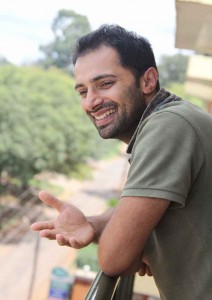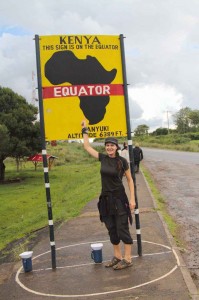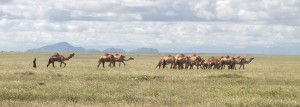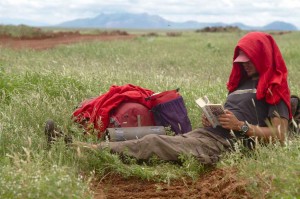Leaving a country of idyllic nature and crazy drivers, we are now heading there, where some people advised us to be more cautious and not to expect too much of friendliness. But hitchhiking at times reveals unpredicted corners, so we are looking forward to a new challenge.
Father Renato – I was drinking blood too
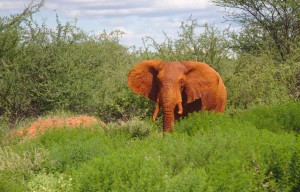
Mus prie kelio pasitikęs dramblys. Su tokiu nesinori susidurti, tad ir mašinoje užtaisomas ginklas. | The giant elephant we saw by the road. No one would like to get in trouble with this one, therefore the gun in the car is loaded.
To receive Kenyan viza is as easy as Tanzanian, so in a quarter of an hour we are already walking on the road. Tanzanian beauty is perhaps seriously contagious, so now Kenyan south seems to carry on the same nice valleys and hills. It is somewhat clear now, why these countries are quite popular to visit. There are a number of game parks, where gentlemen in sand colour attire and bowl-like hats are there to complete ‘I’ve seen it’ list. But we are a bit of different breed because we are coming here at out of season time. The rains are about to swing in their abundance, so you cannot see neither Kilimanjaro nor mount Kenya.
The first vehicle is somewhat surprised, why on earth we are not in buses, but stopping cars and not even thinking of paying, bringing us to the police check point. So we recount the same old story about traveling through continents. ‘But in Kenya we pay for the ride’. ˜Well, in many countries do too. But that’s our way of traveling, we crossed now blah blah…’ In fact, we didn’t see we are going to convince or impress them, so we were about to walk away. Unexpectedly the police stops the Asian looking guy and immediately starts to praise what a wonderful thing we are doing and how we are going to be safe and amiable companions for the journey.
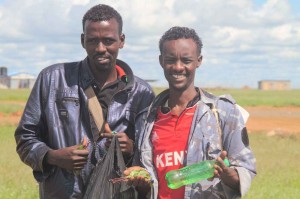
Chat - lapus, populiarų lengvą narkotiką, kramtantys draugiški vietiniai, siūlę pavaišinti mus kupranugarių pienu. | Chat leaves - very popular drug here - chewing friendly locals.
Renato – or Father Renato – is a Filipino missionary here. He works with Masai people. Masai is one of those well known tribes, still holding their culture as it is. They live in the savannas and are shepherds to the goats mainly. ‘Why would you like them to become Christians?’ we ask, and Renato says to expand their faith experience. They believe in mountains or trees, and so now they can have a broader way of believing. On the other hand men are rarely seen in the church as they think this religion is for women and kids. So father Renato tries to lure them by maybe taking a photo of a man at work and including the photograph in the presentation, so people are curious and see themselves on the screen. But also Father Renato in christian way of includes local rituals like blood and milk. ‘Oh yeah, I’ve tried drinking blood too, it’s impolite to refuse’. But he builds the church and nursery together with local people, already knows Masai language and feels here very well.
Nairobi: stories from Somalia
In Nairobi we had a task to get Ethiopian viza, as without it we can not proceed up north. They say it’s difficult but one should try. So we lodge ourselves at our new couchsurfer host Waqas, and go straight to the Embassy.
Embassy smells of coffee. The Coptic cross tattoo on the female consul’s forehead, the she goes through all our visas, hears our plans and seems she is ok with us passing Ethiopia, so in couple hours we already have a visa.
Waqas is our host in Nairobi. He is Pakistani raised in UK, and in Kenya he is temporarily for his missions to Somalia. He runs some support projects there, and we got a short glimpse of how things in the country, where even a sound of it gives shivers. It seems that the clans conflicts brought country to real shatters.
Waqas was perhaps the most keen to hear our travel stories, and that is unsurprising as he himself done very similar experience – hitching and living a very basic life in South America, like Brazil. At times for him was even much harder to find a place to sleep as he is a Pakistani Muslim from UK, which hits all the tick boxes of being a potential terrorist. So even some mosques refused to let him pitch his tent. He knows of what does it mean to travel with very little. We actually had a really good chance to reflect on our character development throughout our journey of life during those days.
Nanyuki – Kenyans that are coming back home
From Nairobi to Nanyuki our journey goes smoothly, as in all our sub-Saharan odyssey. We met two Kenyans that day who have returned to their country after years of living abroad. Theresa is still having family in Switzerland, says she is so much more happy in Africa as here she feels more freedom, community spirit and people friendliness. Johnny as well came back from London to develop his business here. When one passenger in his car asked us to bring him to Europe at least for a day, Johnny ironically remarked that they all think in Europe is heaven where you don’t have to work.
Even though some people warned us that people being that so kind, we actually meet quite a few to host, help or invite for a coffee people. So we guess Africa knows not only how to get but to look after guests too.
To Moyale – with a gun through the blossoming desert
Even if we couldn’t see mount Kenya or Kilimanjaro because of the clouds, rainy season reveals a spectacular side of the desert being all in bloom. ‘So you are going to the north of Kenya? It’s pretty dangerous out there’ people tell us. Still up to this date people who need to pass that area focus and prepare, some even having security on board. Somalia bandits often attack the peaceful drivers, often robbing them of their possessions, but first shooting with their AK47 to stop the vehicles. As the writer Theroux in his journey through Africa told (Dark Star Safari) that at times not so much the money that interest them but shoes or other possessions.
The situation has improved, as now even buses get people to Moyale, but for hitchhikers the trucks perhaps are still the best option. We have been lucky to hitch a ride with a 4wd with a security on board (Rendele tribe man with a gun) up till Mersabit, a town in the middle of of desert up on the mount.
We sat down on the sacks of charcoal and prepared for the long 4 – 5 hour drive through the desert. At first the road is a smooth tarmac, but after 100km drive it stops and then the real ride begins through potholes. From time to time we look around to see if anyone suspicious is around, but instead we see a red-coated elephant, who perhaps was rolling in the red mud.
Rendele and Samburu tribes are the main people living in the region, and the same as Masai they still preserve their lifestyle. Now the desert is abundant of water, so you can see people happily washing their clothes in puddles and drying them on the bushes. Women wear exciting numerous necklaces and men in their minimal clothes. Despite the exotic sights and maybe the first aww at the beginning, we sort of loose that feeling soon. After having seen now many cultures in various clothing across the globe, we see them more of ordinary people with a simple lifestyle and courage to keep their own culture. As long as some government will not come and force them to move to some city ghettos where they would loose freedom and nature as for instance happened in some parts in Brazil.
Mersabit – listening to the lullaby of hyenas
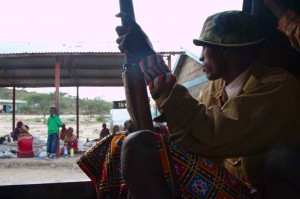
Kelyje link Etiopijos automobilyje reikalinga apsauga, nes pasitaiko iš Somalio kilusių banditų, Sifta. | On the road towards Ethiopia some protection is always good as there are some Somalian Bandits called Sifta.
We finally reach Mersabit, a town on the hills in the middle of the desert. We arrive here pretty late, and immediately pitched the tent at the exit of the town. ‘It is going to be cold here’ one girl warns us. Hope it will be ok, we are tired and not caring for anything. ´Any hyenas?’ we inquire. ‘Yes, some walking around’ the boy was right. These animals sounds were an intro to the long night. They stopped at around midnight, but then ‘mazungu mazungu’ we hear close to our tent. ´We here, we hear you’. So they leave, and the strong stormy rain starts with no compassion to us, finishing just in the morning. You get out of the tent and see some kids already staring at strangers and a man in a gun. He stares at us for some moments and then leaves. Nice morning sight. Everything is in the mist, we are in the mountains after all.
We are back on the road as soon as possible with no breakfast, as the vehicles are not frequent here. In fact in early days it was even worse, but now you see some overcrowded 4wd with Kenyan and Chinese who are working to bui the future road which will bring prosperity. Until it will be needed to fix it again. After seeing the fourth country with Chinese work results you somehow wonder what is their interest here. It seems that they far beyond the western cultures who still has an immense impact but perhaps not for that long.
The desert is long with a terrible road ahead of us. Ethiopian road work supervisor gives us a lift further away, so we have only hundred kilometers away from the border. But we are there in the middle of nowhere, just a camp of Chinese and no one goes Moyale way. So we sit there not knowing how and when we will be able to get out. The herd of camels are passing us, and to be honest we even enjoy being stuck somewhere in some surreal environment, in the middle of the desrert. A total different reality.
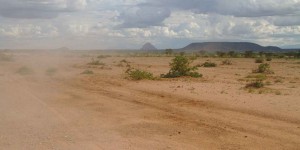
Dulkėti, duobėti ir sunkiai pravažiuojami keliai šiaurės Kenijoje. | Dusty, bumpy and sometimes hardly passable roads to the north.
But some hours later we were lucky enough to stop another 4wd with some Chinese again, who observed the future road more than the blooming desert. We rode long hours through the muddy roads (who said it is a desert), but finally after the sun set down we arrived to Moyale. Ethiopia, we are so close to you.

